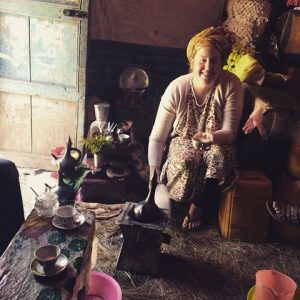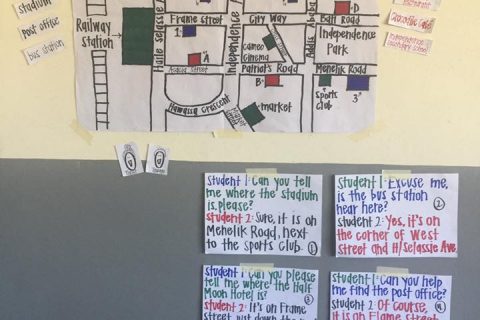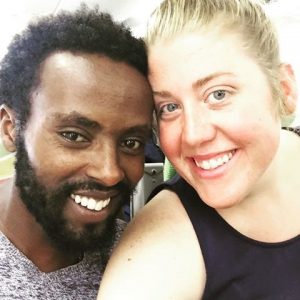The traditional coffee-making process in Ethiopia, the beverage’s birthplace, takes approximately three hours. Locally sourced coffee beans are first screened and roasted over an open fire. They are then hand ground with pestle and mortar and boiled.
“It’s a beautiful, extravagant ceremony that Ethiopians conduct in front of family and friends, sometimes twice a day, after lunch and dinner,” said Alex Wazny ’13, a graduate of Illinois State’s learning and behavior specialist program in the Department of Special Education. “There is no comparison. It is by far the best coffee I’ve ever tasted.”
“Every minute of every day I am taking in something that I never understood before.”—Alex Wazny
The ceremony is among the countless new cultural experiences Wazny has had the opportunity to “drink in” during two years of service as a Peace Corps volunteer. Placed in the developing nation’s Amhara region, she has been teaching ninth grade English since the fall of 2016.
“I wanted to have the chance to live a life that was completely different than the one I was born into, to experience what it was like to live on the other side of the world, particularly in Africa,” she said. “And Peace Corps was a great way to do that.”
Though she never regretted her decision, it was not an easy one for Wazny to make.
“I knew I could give up American food, hot showers, the Internet—all of those things. The hardest part was accepting that I would be away from my family,” she said.
Joining the community
Wazny will be back stateside in July, but said her 27 months of service has felt “like a minute.”

A coffee shop in the Amhara region where #EdBird Alex Wazny often gets coffee. She was asked to take over the coffee-making process for a bit while the owner took a quick trip to the store.
The experience has produced unforgettable, challenging, and surprising moments, starting from the first night she slept in her small rural town. She was surprised by the weather in her part of the Amhara region, which ranges from the mid-60s during the day to the high-40s at night during the coldest season.
“My first night I was lying in bed telling myself ‘I really need to buy another blanket!’” she said.
“Mainstream media describes Africa as one thing, but Ethiopia is very unique in that its cultural traditions are its own, and so is its weather. Every minute of every day I am taking in something that I never understood before.”
Wazny is experiencing Amhara as the literal minority. She is the only white woman and the first Peace Corps volunteer to work in her community.
She said her efforts to respect and embrace Ethiopian culture have led to a sense of belonging that surpasses anything she has encountered in the U.S. In fact, she met her fiance, a host country national, during her stay.
But as an outsider, Waznyshe earned her place.
“I learned the patience to teach people that though I am different, I am also not so different. I’m just another person and a teacher in their community,” she said.
“My first year, I worked with only men. Gender is still a big issue here. Not only did I have to prove myself as an American living in Ethiopia, but I also had a prove myself as a woman and as a teacher.”

A visual aid for one of Alex Wazny’s lessons for her Ethiopian students focused on giving directions. Wazny taught English to ninth graders.
She describes the first time she was observed by the school’s other English teacher as “unsettling.”
“He left 10 minutes into my 45-minute lesson. I had no idea how to take that.”
Naturally, she followed up.
“He told me, ‘You were using active teaching methods, and the students were listening to you. I knew I did not have to worry about you, any longer,’” Wazny said.
Her response?
“Please spread the word!”
Before long, Wazny’s abilities and authenticity were recognized by everyone with whom she came in contact She would become not only a respected teacher, but a trusted friend and resource. Her Peace Corps counterparts, many of whom did not have a background in teaching, viewed her the same way.
‘“I’ve been told that I stood out, and that I still stand out among the people who I work with as someone who knows what they are doing,” she said.
“I got that confidence through all the practice that I had at Illinois State.”
Learning to differentiate
The year Wazny left Joliet Public Schools to join the Peace Corps was the district’s first using the Danielson Framework for Teaching as an evaluation tool. She was among just a couple of teachers in her school to earn a top-level rating.
She credits Illinois State for providing the practice she needed to identify student needs and differentiate instruction. Those skills have also been crucial in her Ethiopian classrooms. Each day, she teaches three classes of 40–50 learners with varying needs in a building of almost 500 students.
“I feel that coming to Ethiopia as a special education teacher has been extremely beneficial,” she said. “I have a very diverse group of students who can speak proficient English and read on grade level, and I have others who are working on learning English at an introductory level.”
Wazny has placed an emphasis on sharing her practices with others. After she gains a rapport with her fellow teachers, she works with them to adapt their teaching to the needs of each learner.
Embracing new perspectives
Wazny said she experiences a new “first” with her neighbors, colleagues, and students every day. A commitment to lifelong learning was one of the reasons she joined the Peace Corps, and that trait stood out during her time at Illinois State.
“Alex was always willing to challenge her own thinking, to make herself vulnerable, and to recognize that she really did have very different experiences than her students,” said Associate Professor April Mustian, who taught Wazny at Illinois State.

Wazny calls this bayonet the best one in her town. It’s a combination of four different wats served on injera.
Mustian also spent time in Ethiopia, and she has served as a source of support and encouragement throughout Wazny’s service.
“I believe Alex is doing so well in her community because she has continued on this journey of development, identity, and growth and is recognizing how big the world is. She has opened herself up to a culture far outside of any experience she has ever had. And I think she’s seeing the benefits of that.”
When Wazny returns home, she plans to continue teaching and wants to pursue a graduate degree. She is also considering a future in international education. Though there are no plans to live abroad, the Peace Corps experience has only just begun to quench her thirst for international travel,
learning, and service.
Recruiting Redbirds
Five minutes separated Wazny from losing out on what she has called the most amazing two-years of her life. Though she has no regrets, she recognizes it is not an easy commitment to make.
“The Peace Corps is always looking for teachers, especially quality educators like Illinois State’s graduates.
“What I say to interested teachers is this: ‘If you can make it work logistically, do it. It is not too late to challenge yourself to be the person who you want to be.’”



I love this story about Alex Wazny! Thanks ISU for posting on Instagram. – Lisa Georgis Bunch Mass Communications Radio/TV ‘83